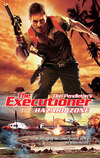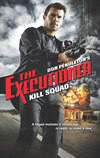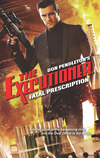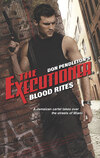Kitabı oku: «The Cartel Hit», sayfa 2

1
“You really believe I’m going to let that cockroach give me up to the cops?” Seb Jessup said. “I will bury that bastard and his evidence.”
Three of his crew members sat in the plush office. Not one of them made any comment. They might have been thinking his outburst was more than a little risky, given that he was already under the close eye of federal authorities who were just waiting for him to step across the line.
But that was Seb Jessup.
A man who had total contempt for the law, society and anyone who dared to cross him. Jessup had a personal mantra: “I go where I want and I do what I want. Get in my way and I will crush you.”
Simple and direct. Jessup believed in being up front with people. They got what they saw. He made no concessions to anyone or anything.
He was in his midthirties, a hard-bodied man who ruled his criminal organization by brute force and cunning. He had a financially successful association with a Mexican cartel over the border, and he traded in weapons and stolen cars. He also had a thriving business in human trafficking. He had no interest in corporate crime. Not for Jessup the sleight of hand in the white-collar world. He was a hands-on racketeer. Jessup liked money. Lots of it. And his territory, which still clung to the well-defined individualism of West Texas, was large enough to accommodate his appetites.
Jessup was entirely a self-made man, and he considered himself a product of his environment. Brought up on a hardscrabble farm, where his family had struggled daily to stay fed, Jessup learned early that a man got what he did only by hard work and grabbing any opportunity that presented itself. He’d made a vow that he would not end up like his folks, worn to a frazzle as they struggled to maintain some kind of life. The land they lived on was hard. The crops they grew were sparse and tended to die off if you turned your back on them.
Jessup’s father was a strong man physically, but less so mentally. Each time he had a setback he would resort to the bottle, becoming surly and downright vicious. The rest of the family was often on the receiving end of Anson Jessup’s hard fists. That went on until Seb’s eighteenth birthday. Tired of being knocked around like a straw-filled dummy, he’d decided to fight back. He drove his bullying father to the ground, his solid fists leaving the man bloody and beaten. For the first time in his life, Jessup’s simmering rage gave him the strength to overcome someone. It would not be the last time that happened.
It was his last day as part of the family. After putting his father down, he went inside the house, packed his few belongings in a bag and walked away. He never looked back.
He spent the next five years in the army. For a boy who had spent long days working the hostile land on a dirt-poor farm, army life was easy. All he had to do was follow orders, and he was given three meals a day, a bed to sleep in and a wage. When he heard other recruits grumbling about the hard life, Jessup had grinned. They knew nothing. He’d kept his head down. He was a quick learner, and he quickly gained promotion. The day he was made corporal was something he was quietly proud of.
He was eventually shipped off to the Middle East and saw a side to life he’d never even thought about back in West Texas. He witnessed killing and destruction. Experienced his first action and found himself facing the possibility of his own death. His training kicked in and he accepted that he either put it to good use or he was going to die right there and then in the midst of the dust and flies and the rattle of gunfire. He was promoted to sergeant.
He met Cole Hatton while he was in the war zone. They clicked from day one. And when the chance arose, they teamed up in a partnership that would follow into civilian life. By the time they were sent back stateside, Jessup and Hatton were considerably wealthier than when they’d first put on uniforms. The army was bringing in vast stores of goods to keep the American forces fed, clothed and armed. It was to be expected that some of those supplies would be diverted. Jessup found a way by bringing in one of the civilian contractors the military was using. Siphoned-off materials were flown back to the States, using the contract aircraft that were coming and going on an almost daily basis. Jessup started small, not wanting to attract attention, and that, coupled with the money he was pulling in from deals with the locals for food and clothing, all added to his growing cash balance.
While Jessup provided the brains, Hatton became the partnership’s muscle and backup. He handled any problems that might interfere with the operations. He did it well. He was direct and dedicated, with a persuasive manner that told anyone getting in the way that it would be extremely advisable to step aside.
They set themselves up back home, building their criminal business with a dedication that would have been the envy of any hardworking entrepreneur. They operated out of a midsize community called Broken Tree, in cattle country. It was a tough town in tough borderlands.
Nine years down the road and they were established as the major player in the region. Jessup had connections across the board. He’d bought and paid for influence in high circles. He ran his organization with a hard hand and took no crap from anyone. His name opened doors, his wealth bought him the rest.
He had his world by the balls. Saw himself as untouchable. Out of reach. A big man in a big piece of country.
One of his most lucrative ventures involved bringing illegal immigrants across the border. Mexico provided plenty of people who were eager to enter the US, lured by the promise of work and money. The promises came true, though they weren’t as clear-cut as the immigrants had been led to believe. Money, yes, but the expenses incurred when they were brought to America were taken from their paychecks. If they protested, they could be exposed to the authorities. That could mean jail, or being sent back to Mexico. There were times when Jessup’s enforcers would hand out physical persuasion. The Mexican laborers were just another product, as far as Jessup was concerned. He bought and sold them. Had the power to make them disappear if the notion came to him. There were plenty of lonely and desolate places in border country where bodies could be, and were, made to vanish.
Jessup believed his most recent enterprise would prove to be even more lucrative. He’d met with Ramon Mariposa, the jefe of A La Muerte, an offshoot of the Sinaloa drug cartel. Ramon Mariposa was looking for a US distributor and Jessup had been interested in growing his presence in the drug trade.
Mariposa had learned Jessup was a solid, well-organized man who ran a thriving business, and the jefe also needed a steady supplier of weapons. The drug cartels were in a violent, ongoing war with competitors and Mexican law enforcement. In a brutal business, A La Muerte was way ahead of its rivals. Mariposa operated with total, unflinching violence. He saw no reason to do otherwise. His need for a reliable supply of quality ordnance was something Seb Jessup could manage easily.
In the end, it was a marriage of convenience. A two-way street. Mariposa and Jessup’s relationship was beneficial to both, workable and problem free.
Until Hermano Escobedo started to rock the boat.
Rocked it with such ferocity that Jessup, for the first time since he’d faced combat, experienced fear.
He maintained his cool in front of his people, while inwardly feeling sick. Not because he was about to cave in under the threat posed by Escobedo, but because he realized for all his power, influence and wealth, he was still vulnerable. Jessup might have been resistant to threats against his security, yet he saw the shadowy possibility that his empire could be badly damaged—even brought down—by the young Mexican. Escobedo was the unexpected threat, the one coming out of left field. And he just might be capable of knocking Jessup off his throne.
Hermano Escobedo obviously felt he had justification, a good reason to strike out. Otherwise, he wouldn’t have placed himself in the firing line. In truth, Jessup could even sympathize with the young man’s motivation. But he still had to stop him.
If Escobedo brought his evidence into the light, Jessup could face life in prison—or even execution. He understood the penalties, and despite his position of power, realized he might conceivably pay the price.
He was going to have to play this one carefully. Hatton had broached the subject, pointing out that Jessup needed to keep his distance. No hands-on punishment this time—which pissed Jessup off. He had always been a hands-on participant. But his partner was insisting he lie low.
“We do this smart,” Hatton said now. “Pull in outside help, give them the details and turn them loose.”
“Not our boys?” Jessup asked.
“Nope. We stay clear. I talk to them, they keep me informed. We fund this with cash. Nothing written down, no computers—only disposable phones. Seb, we can pull this off. Take the bastard down and wipe out the evidence. With nothing to hang on you, the law is going to be pissing in the wind.”
“Trouble with wind, Cole, is that it can change direction.”
Hatton shook his head, a grin on his lips. “You were the only grunt who could make a joke with bullets flying over your head,” he said.
“What can I say, buddy?”
Hatton levered his rangy frame out of his chair, pulling his phone from his pocket. He held it up as he walked to the door. “Today’s burner,” he said. “I’ll make the call. Bring Candy in for a head-to-head. We’ll get him on the case and set him loose on Escobedo.”
“You figure that chili popper is going to make trouble, boss?” one of the remaining two crew members asked.
“He’s going to try,” Jessup said.
The other man said, “If Cole sets Candy on his ass, that boy isn’t going to have another minute of peace. Hell, Seb, you recall when Candy went after that sucker down Nueces way? He had that done and dusted in a couple of days. No one ever found that feller’s body.”
“That’s the way I want it with Escobedo,” Jessup said. “Gone.”
* * *
HATTON STOOD ON the wide porch fronting the big house, speaking into his cell.
“I want you to drop everything, Candy. This is important. Wouldn’t offer it to anyone else. You sort this out for Seb and it’ll be the best payday you ever had.”
“He got himself in a bind?” Candy asked. His voice was low and slow, a homegrown Texas roll.
“Sort of. Candy, this needs clearing real fast. No mistakes.”
“Kind that needs a shovel to finish it?”
“That kind. Dead, buried, forgotten.”
“My specialty.”
“The Meat Wagon in an hour. Okay?”
“Fine,” Candy said, and hung up.
The Meat Wagon was a diner on the west side of Broken Tree that had been there for more than twenty-five years. The aluminum siding had weathered, the metal dull and pitted, but the painted sign had been refurbished recently. The original owner, Hoyt Dembrow, had died a few years back and the diner was managed by his son, Hoyt Dembrow Jr. Junior was over fifty and looked it, so the youthful title didn’t do him any favors. The man liked the food he served in the diner, sampled it every day. His ample size showed that.
As Hatton stepped inside an hour later, the familiar smells of coffee and fried food hit him. He liked that. The Meat Wagon was a piece of stability in a rapidly changing world. It had no offshoot truck franchise, no menu with fancy food catering to dietary needs. It served American food, period, and that was the way Hatton liked it.
He spotted Candy at the back end of the diner, facing him over a raised mug of coffee. At this time of day there were only a few other customers, and Candy had picked the table farthest away, leaving an empty stretch between him and the other eaters. Hatton’s boot heels clicked on the metal floor as he made his way over, stopping to speak to the owner en route.
“Hello, Junior. Coffee?”
“Sure enough, Cole.”
Hatton took the offered cup and joined Candy, dropping his cowboy hat on the table beside him. Candy watched, not saying anything, as he pulled a thick envelope from his jacket and slid it across the table. Candy picked it up and lifted the flap, flipped through the thick wad of bills inside and nodded briefly.
“Down payment,” Hatton said. “Usual terms.”
“You paying for the food, as well?” he asked.
“Don’t I always?”
Candy’s lean, weathered face showed a thin smile. He was a six-foot-three whip of a man who dressed like an out-of-work line rider. He raised his hand and summoned the waitress, ordering a big steak with all the trimmings. Hatton went for his weakness: a stack of pancakes with syrup, bacon and a couple eggs on top. While they waited, Hatton pulled out some photos and showed them to Candy.
“Hermano Escobedo. Son of a bitch is ready to drop the hammer on Jessup. He has evidence that could see Jessup locked up for the rest of his life. Or worse.”
“And Seb, naturally, don’t sit comfortable with that.”
Hatton handed over a folded sheet of paper. “Everything we have on the guy,” he said. “Ain’t much. He came over the border a few years back. He’s legal. Set himself up doing all kinds of hands-on work. We took him on account of he’s got a green thumb and does a tidy job. You know how Seb likes his place looking homey.”
Candy drained his coffee and signaled for a refill. “Jessup want his body delivered—or just vanished?”
Hatton let the question hang for a few seconds.
“Hell, Candy, what would we do with a body messing up the place?”
“Just needed to clarify the situation.”
“Well, it ain’t hard. Find him. Put him out of his misery. Bury him in the desert and keep the shovel for a souvenir.”
Candy smiled. “Hey, why’d you not say it was easy as that?”
Hatton made no comment. He knew the way Candy operated. He might make light of the deal in conversation, but in reality he was a professional who made people disappear. He gave off the impression of being a good old country boy, when he was, in fact, one of the most coldhearted men Hatton had ever come across. Candy took pride in his line of work, employed the very best and never, ever walked away without completing a contract.
They fell into light conversation until their food arrived. Eating became the most important consideration after that, neither man saying very much until they were done.
“When you catch this son of a bitch you need to look for his cell phone. He filmed Jessup. If the law lays its hands on it…”
“I get it,” Candy said. “Don’t you fret. It’s as good as done.”
“You know how to contact me if you need to,” Hatton said. He finished his third coffee, pushed his plate aside and stood up. “While we were deciding how to deal with this, I set a couple of our boys on the job.”
“That’s fine,” Candy said. “Give me the word if they find anything.”

2
The call reached Mack Bolan, aka the Executioner, at Stony Man Farm. He was off mission, had been for a few days, and was beginning to wonder if the world had shut down. He knew that was a forlorn hope. Somewhere, something was happening, or about to, and he was outside the zone.
Then his phone buzzed. He picked up and heard Brognola’s voice.
“Can you meet me in the War Room in five?”
There it was, then. Back to work.
Brognola nodded as Bolan entered the room. “So what do you have for me?” he asked the Big Fed.
Brognola handed over a thin file from his desk, and Bolan studied the head-and-shoulders image of a good-looking man in his early thirties, thick black hair across his forehead. There was intelligence in his dark eyes.
“Hermano Escobedo,” Brognola said. “Good guy. Trying to make his way. He entered the country from Mexico legally, sponsored by a friend. The photo is a couple years old. Escobedo lives and works in Broken Tree, West Texas.”
Brognola slid another photo across his desk.
A hard face stared back at Bolan, defiance in the man’s expression. Almost immediately, the soldier sensed something off-kilter.
“Seb Jessup. Texas native. Hard-ass, but smart. A spell in the army dropped him into the thick of combat in the Middle East. Army trained him to kill, and it looks like he picked up other bad habits. When he came home, he set himself up in business in Broken Tree. Built a reputation. Surrounded himself with a hard crew. Into all kinds of rackets. Soon had the money and the clout to rise to the top and stay there. Hires the best legal backing available. We know Jessup is into hard crime, but nothing’s been proven. He’s the bad guy in this little drama.”
“What’s the connection?”
“Escobedo has the goods on Jessup. Called us willing to help. Said he had hard evidence that would put Jessup behind bars, that he would hand over what he had if we could keep him alive and safe. He’s no fool, Striker. Just an honest man willing to go that extra mile.”
“So what happened?” Bolan asked, knowing he wouldn’t have been called in if this was a simple matter of witness protection.
“Escobedo was doing some landscaping for Jessup, working in his gardens. He witnessed a pair of Mexicans, young man and woman, being beaten in one of the stables. Jessup himself was leading the attack, using a baseball bat. He was going wild. Yelling about them screwing up a deal. He swore he was going to make them an example. Escobedo told us Jessup didn’t stop until the two were dead. And he said he caught it all on his phone.”
“Bad place to be for Escobedo,” Bolan said. “But you have to give him credit. That takes courage.”
Brognola nodded. “Anyway, word came to me after the two US Marshals sent to pick him up were gunned down. Something must have leaked after Escobedo made the call. When backup finally got there, he was gone. No one knows where he went. Striker, we need you to find him. He stepped up to help and now he’s out in the cold. He’s not going to trust anyone with a shield. And he knows Jessup’s people will be out looking for him.”
All Bolan had to go on was the photograph, plus the few facts Brognola had provided. But they told the soldier all he needed to know about Escobedo. He was an honest man who had become a target because he had stood up to be counted. His courage made him a threat to Seb Jessup, and men like Jessup reacted to threats by eliminating them. Two people had already died.
Jessup had defined the rules, so Bolan would play by them.
It was a simple procedure. Jessup, by his actions, had shown himself to be beyond the law. He worked his criminal enterprises with no concern over who got hurt. He was arrogant in his refusal to walk the line. Bolan knew his type. He fought them every day. The takers. The destroyers. Those who held nothing but contempt for ordinary people. It was those ordinary people Mack Bolan stood up for. They were unable to fight back against the lawbreakers, so the Executioner did what he could to redress the balance. It was a long-term campaign, but one he accepted willingly.
Now his priority was to protect Hermano Escobedo. It was too early to assess the magnitude of the opposition. Bolan simply knew Jessup would throw a sizable force into the field. As many bodies and as much money as it would take.
Bolan was one man. That itself might work to his advantage. He had the technical resources of Stony Man as backup, but Mack Bolan was well used to his lone wolf status. It was the way he worked best. One man could move quickly, and he didn’t need to wait for others to respond. He didn’t have to hold back while others hesitated. Bolan went in at his own speed, making his decisions on the go, and there were no rules of engagement to consider. If something needed doing he simply went ahead and did it.
“Hal, bring Jack in. I’m going to need a ride to Texas.”
Ascensión, Chihuahua, Mexico
* * *
DRY AND DUSTY wind blew in from the open land beyond town. Hermano Escobedo felt the gritty detritus patter against his clothing as he walked the quiet street and ducked his head against the persistent dust. It was the time of day when sensible people stayed indoors to wait out the heat of the afternoon and take a siesta. Escobedo allowed a faint smile to curl his mouth at the thought.
Sensible people.
People with no worries except what to make for dinner and the price of gas.
But he was not like them. The days of normality were far behind him. Now he was a man alone, forced to turn his back on his few friends for fear of drawing trouble to them—or finding out they weren’t such trustworthy friends, after all. Escobedo knew what could happen if one of Jessup’s men found out someone knew too much. So he spoke to no one and made his plans to leave the area. He did this carefully, but he understood the way his enemy worked. Jessup had secretive ways of sniffing people out, using his money and the men who worked for him. If they located Escobedo, his life would not be worth very much.
The US Department of Justice had promised him protection. That he would be safe under their watchful eye. He had believed them, trusted in their competence to do what they’d promised. And at first it seemed to have been working. But then everything changed.
His protectors had failed him. Not only that, but they had forfeited their lives.
He’d escaped with his own, but now he was an open target. He had made the fatal mistake of threatening to expose Seb Jessup.
Escobedo knew enough about his former employer to understand he had so much influence and money, so many people in his pocket, that even thinking about going up against him was like peeing on an oil rig fire. It was a gesture. Nothing more. The man would hound him. Push him around and stall any effort to make his accusations stick. Already Escobedo had been thrown to the wolves. His contact with the law had been severed. Two men were dead and he was isolated.
So he walked away. From his friends. From his home. From everything that could be connected to him.
He had taken a crowded bus into Mexico. An old vehicle with tired suspension, it had bounced over every rough spot in the road. He’d endured the dusty, noisy ride in silence. When the coach reached its destination, Escobedo grabbed his backpack and climbed out, then bought a ticket that would take him deeper into the country. The coach he boarded this time was even older. There was no glass in the windows and as soon as the vehicle chugged onto the potholed local road, dust drifted inside. The seat under him was poorly padded and oily fumes from the engine filtered up through the rusty floor.
Escobedo opened one of the plastic bottles of water he had bought, and took a mouthful. He sat back, channeling out the noise, and tried, unsuccessfully, to relax.
He did not fool himself into believing that once he’d crossed that border he would be completely safe. But he believed he’d have some advantage on home turf. He’d be better able to lose himself in a country he knew intimately than he would in the US. Here he could melt into the background.
That was his hope, though already he was considering the validity of the moves he was making.
He stared out the bus window, seeing only the dry landscape.
Escobedo checked carefully each time the bus stopped to let off passengers or take on new ones. He scanned the other riders for anyone who stood out, but saw only the expected locals. Still, he couldn’t relax fully. He couldn’t rid himself of the suspicion Jessup might already have his people in place.
The village appeared out of the haze. Escobedo knew it well. In the years he had been gone, very little had changed. The tired buildings, the uneven road. At one time he’d called this place home.
It was Ascensión.
The town he had left to go to America. And like many pilgrims who walked away, he was now returning, because in his time of trouble he could think of nowhere else to go.
The village square still housed the stone fountain surrounded by skinny trees. There were no new buildings, just the familiar, whitewashed ones he remembered. As Escobedo stepped off the bus, memories came flooding back. He settled his backpack and walked across the square to the church as the bus disappeared in a cloud of dust.
Escobedo stopped at the base of the worn stone steps that led inside.
How long since he had been inside a church?
Too long.
Now he hesitated outside the house of God and wondered exactly what he was doing there.
He paused for a second too long. About to walk away, he was disturbed by the deep voice that spoke to him from the shadows just inside the open door.
“Hermano Escobedo? Yes, it is you.”
Father Xavier stepped into the sunlight, arms extended. His creased brown face held an expression of delight as he looked down at Escobedo. He must be in his seventies now, but to Escobedo the priest had changed little over the years. He wore the brown robe and sandals he always had. He was a man of medium height, lean and agile, a man who reveled in his chosen calling and was imbued with an inexhaustible energy.
He reached out to Escobedo and embraced him, holding him close for a while.
“You remember me so easily?” Escobedo said.
“Mano, I would be failing in my calling if I could not recognize one of my flock.”
“Even after so many years? After I walked away from the church?”
Xavier smiled. “My son, because you have strayed from the path, God does not abandon you.”
“Still the persuasive words.”
“Mano, I have been doing this a long time. And by your tone I suspect you have much on your mind.” Xavier made a welcoming gesture with one hand. “Come inside so we can talk.”
Escobedo found himself following the priest. As he passed through the open doors he felt the silent calm reach out to blanket him. Felt the coolness within.
Father Xavier led him past the pews, pausing at the altar, then turned and headed to the rear of the church, where he had his living quarters.
“Nothing seems to have changed,” Escobedo said as he stood in the doorway. “It’s like I have never been away.” He paused then, guilt rising as he recalled something he had half forgotten. “Father, I ask forgiveness for not thanking you for what you did for my grandparents. How you arranged to have them buried, and let me know.”
“You sent me a letter in reply.”
“It was too little and too late.”
“But you did not forget. That is the important part.”
“Father…I…”
“Sit down, Mano,” Xavier said.
Escobedo slipped off his backpack and took a seat, watching as Xavier busied himself at the simple stove, boiling water to make coffee. He handed Escobedo a cup, took one himself and sat across from the younger man.
“Your journey here now has to be more than a simple desire to return to your home,” he said. “It has to be something important to bring you all the way back from America.”
“Perhaps I just wanted to make a visit.”
“Mmm.” Xavier nodded. “But something more than that, I feel.” He sipped his coffee.
“You’re right, Father. I came because I needed somewhere to hide.” Escobedo stared at him. “It was not in my heart to seek absolution. Or to burden you with my problems…”
“But when you saw the church, the old feelings drew you here.” Xavier smiled. “It is well known the church embraces those who seek comfort. Whether they believe they need it or not.” He paused. “Is that not so, Mano?”
Escobedo drank more of his coffee and allowed his thoughts to assemble in some kind of order. Then he told him what he had seen and the danger he now faced.
“And do these men have guns?” the priest asked.
“Sí.”
“And do you, Mano, have a gun with which to defend yourself?”
“No, Father. I have nothing. I am not a man of violence.”
“Then you did the only thing you could, and walked away from these people.”
“I could not think of anything else I could do.”
“A wise move. Now, will you stay here? Or move on? This I ask only so that I can make some arrangements.”
Escobedo shrugged. “The last thing I wish is to bring my problems to you.”
“Do you believe these people may come here?”
“It’s possible. I’ve been selfish and thoughtless. I thought coming here would put me out of their reach, but that was stupid of me. I need to go. Move on before people get hurt because of me.”
“You will do no such thing, Mano. Let me think about this. I am sure we can figure out something.”
“Ascensión is small. The people here can do nothing against these men. I will only bring trouble.”
“Then we must get you far away. To a place where even these people cannot find you. Trust me, Hermano. I have a good friend. A priest who has a church in a small village much like Ascensión. It’s by the ocean, below Culiacán. There you can have the time to decide what you must do.”
“This could be dangerous for you, Father Xavier. Too dangerous.”
“Let me worry about that. Mano, it may take me a few days to arrange this. Until it is time to go you will need to remain as out of sight as possible.”
“I could go the family farm. Now my grandparents are both dead, I’ll be alone there.”
“Good. I will send for you when everything is ready. I can get you food, and old Quilla can lend me a burro.” Xavier smiled. “Have you remembered how to ride one?”
Ücretsiz ön izlemeyi tamamladınız.

















